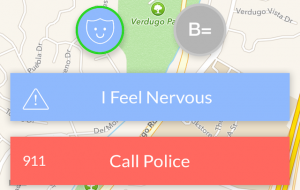Need a companion? never walk home alone at night again
The sense of personal safety, “rape culture” and privacy are some of the most hotly-discussed issues on US campuses nowadays . It was reported this year by the American Justice Department that just about over 293,000 rapes occur in the United States annually, while the recent number of harassment complaints and lack of security feelings have been gradually inclining across the nation. The term “rape culture” has been frequently used to describe a phenomena that is twice as likely to occur in America than in the United Kingdom for instance. To make a long story short, the term refers to the unbearable lightness of how rape is treated in America today – whether it goes unreported by victims, or is generally ignored by politicians and authorities. Nowadays, despite very clear evidence, some people still doubt the existence of rape culture in US campuses. How clear is the evidence you might ask? It is so clear that there are over a hundred universities across the United States, which are currently under federal investigation for not reporting, or not sufficiently dealing with rape and assault incidents. So how big a problem is it really in contemporary America? we’ll get back to that shortly.
It was this growing issue that became a reality on a lot of campuses, that prompted the birth of Companion, a recently-developed smartphone app, which was created by five driven University of Michigan students, and launched into the market last month. The students told USA Today that whenever any form of attack occured on their campus – robbery, rape etc. the entire student population would get detailed email alerts that would be, to say the least, an unsettling experience for them. Moreover, they felt their College Hall did not do enough to fix the issue. Therefore, in August 2014, they decided to do something about this. Having done computer developing internships before, they’ve worked on it and launched its second, official version last month. By doing so, they’re hoping, it would not only make students feel safer at night and possibly decrease such incidents, but would also raise awareness to this nationwide problem that is so commonly experienced by students, and not sufficiently dealt with by the authorities.
The five University of Michigan students behind Companion, with the twenty-thousand Dollar cheque that got them started. (Photo from USA Today, courtesy of Lexie Ernst)
Companion works in quite a straightforward manner and is user-friendly – you fill in the address of your destination, and pick one or more people on your contact list as your companions, people who are now connected to you online and can follow the route you’re taking on your way to your final destination. If, at any point, it shows that you went off-course or started running, the built-in sensor function on your phone allows your friends to see that and send you a text asking if everything is okay. Within fifteen seconds, in case you haven’t answered back, a loud alarm sound is switched on automatically to scare away potential attackers. Alternatively, in case you feel uncomfortable or at danger, it is possible to click a panic button that would immediately alert your companion contacts to whom you’re connected online, or a “call the police” button. There are already a number of similar safety apps out in the market, but Companion stands out as an students for students app, which features the above-mentioned alarm system, activated by your companions, should they feel you’re at risk.
Companion has been gaining a lot of attention by students and the media alike since its nationwide launch last month. Students of different universities and colleges praised the initiative, calling it a very good idea. Hanging out in town at night could potentially become a lot safer now. The app has been downloaded about 500,000 times since the beginning of September. It appears that it is not only on its way to becoming one of the most common student apps in the United States, but it is also a much needed tool in contemporary university life. So does rape culture really exist in the United States? and how big a problem is it for students nowadays? Judging by the reception and popularity Companion has been met with, I’d say quite a big one. Those universities will be under investigation for a while. The app creators say they’re open to tips and suggestions for improvement. There’s hope.
References
Ali, Aftab. “University of Michigan Group Launches Companion App to Ensure Students Get Home Safe at Night.” The Independent. The Independent, 11 Sept. 2015. Web. 13 Sept. 2015. <http://www.independent.co.uk/student/news/university-of-michigan-group-launch-companion-app-to-ensure-students-get-home-safe-at-night-10496987.html>.
Hayes, Timothy. “Why Is There a Rape Culture on Campus?” Uloop. Uloop, 11 Sept. 2015. Web. 12 Sept. 2015. <http://www.uloop.com/news/view.php/170271/Why-is-There-a-Rape-Culture-on-Campus>.
Rhodes, Samantha. “Companion App Promises You’ll Never Walk Home Alone Again.” USA Today. USA Today, 11 Sept. 2015. Web. 12 Sept. 2015. <http://college.usatoday.com/2015/09/11/companion-app-promises-youll-never-walk-home-alone-again/>.
Wong, Kristin. “Companion Helps You Stay Safe When You’re Walking Somewhere Alone.” Web log post. Life Hacker. Life Hacker, 21 Aug. 2015. Web. 11 Sept. 2015. <http://lifehacker.com/companion-helps-you-stay-safe-when-youre-walking-somewh-1725523995>.

